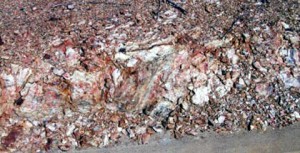 When talking about the wines from Berlou (Languedoc), one usually also talks about the Coopérative, because it is the Coopérative that sets the tone here - off the beaten track in the valley of the Orb at the foot of the Cevennes (better: their foothills). About ten years ago, the small winegrowing village (200 inhabitants) created its own communal appellation (Saint-Chinian Berlou). This is not simply a peculiarity or idiosyncrasy of the Languedoc; it gives wine lovers a certain guarantee of quality and, above all, of the independence of a terroir. Just in a wine region, the largest in France, where mass wine dominated during decades, with a lot of Carignan, a grape variety with supposedly few aromas and well suited for large yields, the terroir idea has a central function: "We have gone back to our roots", says the director of Les Coteaux de Berlou. And he can be proud of it, since the Berlou wines are meanwhile among the best ones of the region, at least among the ones full of character and most independent.
When talking about the wines from Berlou (Languedoc), one usually also talks about the Coopérative, because it is the Coopérative that sets the tone here - off the beaten track in the valley of the Orb at the foot of the Cevennes (better: their foothills). About ten years ago, the small winegrowing village (200 inhabitants) created its own communal appellation (Saint-Chinian Berlou). This is not simply a peculiarity or idiosyncrasy of the Languedoc; it gives wine lovers a certain guarantee of quality and, above all, of the independence of a terroir. Just in a wine region, the largest in France, where mass wine dominated during decades, with a lot of Carignan, a grape variety with supposedly few aromas and well suited for large yields, the terroir idea has a central function: "We have gone back to our roots", says the director of Les Coteaux de Berlou. And he can be proud of it, since the Berlou wines are meanwhile among the best ones of the region, at least among the ones full of character and most independent.
But this "Spring of the Wolves" is not a wine that the cooperative markets itself. "Mise en bouteille à la proprieté pour JeanJean", it says on the label. JeanJean is one of the largest trading houses (also with own vineyards) in the region. His wines also regularly reach the big department stores, in this case the "Hyper-U", where I bought it. For me, somehow a synthesis of modern marketing - with a tendency to uniformity - and independent tradition - of a special  Region (among other things with a lot of slate). The wine is also not in the sales temple in the specially cooled, "holy halls", where the top wines are (wines from about 20 euros), but in the huge shelves, where rather wines for everyday consumption are offered. (This wine costs 8.50 euro here)
Region (among other things with a lot of slate). The wine is also not in the sales temple in the specially cooled, "holy halls", where the top wines are (wines from about 20 euros), but in the huge shelves, where rather wines for everyday consumption are offered. (This wine costs 8.50 euro here)
Knowing Berlou wines pretty well, I was naturally interested to see if this merchant wine was any different. Is it still Berlou-like? It is, even if the nose initially registered a little too much stale or alcohol. On the palate, however, it developed finesse and power, and quickly made up with me: it's not one of those souped-up Languedoc tropes you keep coming across, especially in the mid- and low-end segments. A wine full of character, the origin is taken off: fruity, silky, slate-fresh, quite with quietly playing spices. One can find not only pleasing, but also independent, even exciting wines in the supermarket.